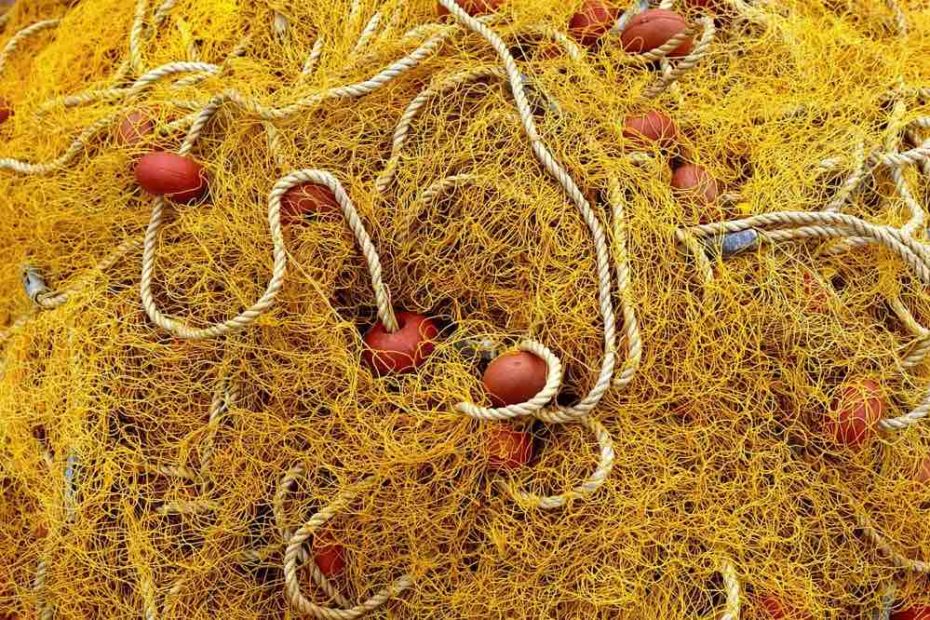Do you swear by a metal straw? Always carry a reusable bag when you go shopping? You probably do this because you, among others, are told of the catastrophe of cumulative plastic waste found in our oceans, and think that switching to a plastic-free consumer lifestyle will reduce this.
You are playing your part…to an extent. Unfortunately it may be hard to hear that, according to a hugely influential study of 2018 that fishing nets are the biggest source of ocean waste. A whopping 46% of plastic waste is from these fishing nets, not your plastic straws. [1] Fishing nets are composed primarily from the non-biodegradable nylon and eventually break down into microplastics.
Head scientist at the Ocean Conservancy, George Leonard, notes that, ‘At least half of […ocean waste] is not consumer plastics…but fishing gear.’ [2]
As you may know, abandoned fish nets strangulate marine life and therefore contribute to the effect of ‘ghost fishing’, where fish beyond the desired industry are caught by ‘accident’ and are washed up on shores. Beyond this, however, the abandoned fish nets contribute to coral reef decline (also caused by trawling), and encourage parasites to enter the marine ecosystem. After eventually breaking down into microplastics, they enter the stomachs of all marine life, which we, in turn, will eat.
Essentially, we are excessively damaging the marine environment through our fishing industry, and also are damaging ourselves. To this date, laws regulating the recycling of broken fishing nets are hardly in existence in the UK. This, quite simply, allows the government to turn a blind eye against fishing net abandonment.
So what can you do to help sort this mess? How can you reduce plastic waste from fishing nets?
Stop Eating fish
The best way to avoid contributing to plastic waste, and also ingesting microplastics from this waste, is to stop eating fish. At RYH, we cater for all diets, but it would be wrong to deny this fact – if reducing plastic waste is your priority, you should consider omitting fish from your meals. All sources of fishing inevitably contribute to an increased % of plastic waste – no fisherman is exempt from abandoning fishnets – regardless of the scale at which they are fishing. At RYH we have an abundance of vegetarian and vegan dishes that you can have access to if you sign up to the platform, also taking into account food preferences and allergen requirements. Check out our instagram for more inspiration of fish-free feasting!
Donate to charities
You can donate to charities that launch sea-diving campaigns to remove these abandoned nets from the UK coastline. Two of the most notable and successful charities are Ghost Fishing and Sea Shepherd.
Buy products made from recycled fishing nets
Have a spare bit of cash and would rather buy something for yourself, friends or family? There are several entrepreneur initiatives that transform plastics from abandoned nets into other products. A full breakdown of businesses that create such products in Europe in 2018 can be found at this link.
Our favourite brands are Bureo, Deakin and Blue and Ruby Moon. Bureo will inevitably have something for you or your family – selling clothing, jenga sets, frisbees and skateboards. If you’re looking for new swimwear and activewear, the latter two will help you out!
For more ideas about what else you could do, take a look at Exxpedition, a Community Interest Company that runs all-female sailing research expeditions at sea and virtual voyages on land to investigate the causes of and solutions to ocean plastic pollution.
Sources
- Lebreton, L., Slat, B., Ferrari, F. et al. Evidence that the Great Pacific Garbage Patch is rapidly accumulating plastic. 2018
- https://www.nature.com/articles/s41598-018-22939-w?utm_medium=affiliate&utm_source=commission_junction&utm_campaign=3_nsn6445_deeplink_PID100104362&utm_content=deeplink
